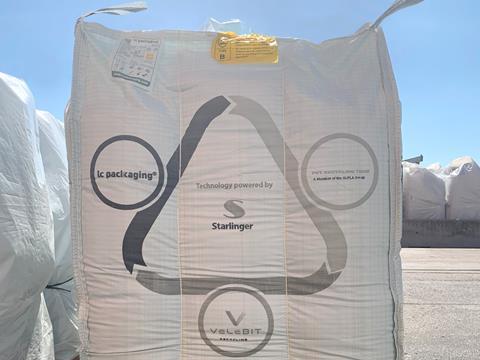
ALPLA Group member PET Recycling Team has joined forces with LC Packaging, Starlinger, and Velebit Recycling to recycle its flexible intermediate bulk containers (FIBCs), or Big Bags, into new FIBCs and close the loop on the packaging used to transport its recyclate.
Big Bags are used to transport and store recycled PET granulate until the converting plant can process the material into preforms for blowing bottles. Empty bags are sent to Velebit’s facility to be recycled into post-consumer recycled polypropylene granulate.
This is then converted back into Big Bags by LC Packaging’s production partner using Starlinger’s rPP extrusion technology. Although the FIBCs are no longer suitable for food-contact applications in their new form, they are said to contain 30% recycled content.
According to Velebit Recycling CEO Manfred Pribyl, a constant and high-quality input flow “means that we can run our machines at high efficiency.”
“With our recycling and extrusion technology, Starlinger acts as the connecting link in this project, providing the high-quality recycled polypropylene and heavy-duty tapes needed for Big Bag production,” adds project manager rPP Andreas Anderl.
The companies emphasize the importance of using post-consumer recyclate rather than post-industrial recyclate in the project, with its previous use, sorting, collecting, cleaning, and recycling into new recycled polypropylene granules claiming to result in a positive environmental impact.
Their next step is to ensure that the recycled materials can be used in food-contact bags, which is thought to require traceability and appropriate documentation. It is also hoped that the loop can be extended to include end customers of the ALPLA Group.
“With this solution, we achieve a significant reduction in waste, since used Big Bags are now turned into new Big Bags that we can use again for our purposes,” explains Christian Hude-Burian, plant manager PET Recycling Team Wöllersdorf, Austria. “This helps us to save natural resources and reduce our CO2 emissions.”
“A big advantage of this project is having access to a continuous stream of premium quality recycled material,” continues Thorsten Classen, managing director at LC Packaging.
“This project shows that if the right parties work together and are willing to invest and pioneer, we can make a significant environmental impact by means of a closed loop solution that delivers benefits for everyone. And we are ready to take on the next challenge together when it comes to realizing a food-safe closed loop in the future!”
Another joint venture between the ALPLA Group, Ecohelp, and United Polymer Trading saw the opening of, and the beginning of production at, its first PET recycling plant in Romania. It seeks to supply food-grade rPET for the southeast European market by producing approximately 18,000 tonnes of recycled material from household waste every year.
Berry Global has also been nominated as a finalist under the Driving the Circular Economy category of the Sustainability Awards 2023 for its Closed Loop Recycled Paint Containers.
If you liked this article, you might also enjoy:
The L’Oréal approach to packaging sustainability
What steps is Apple taking to make its packaging more sustainable?
How did Brazil achieve its 100% aluminium can recycling rate – and can it be replicated in the EU?
Experts have their say on the EU’s Packaging and Packaging Waste Directive revisions













No comments yet